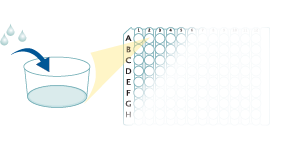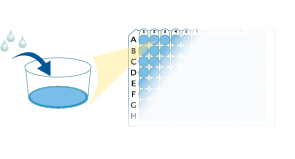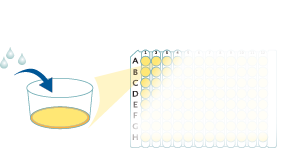Human SCF Quantikine ELISA Kit Summary
Product Summary
Precision
Cell Culture Supernates
| Intra-Assay Precision | Inter-Assay Precision | |||||
|---|---|---|---|---|---|---|
| Sample | 1 | 2 | 3 | 1 | 2 | 3 |
| n | 20 | 20 | 20 | 20 | 20 | 20 |
| Mean (pg/mL) | 153 | 709 | 1427 | 151 | 729 | 1552 |
| Standard Deviation | 3.6 | 11.6 | 61 | 12.1 | 45.8 | 125 |
| CV% | 2.4 | 1.6 | 4.3 | 8 | 6.3 | 8.1 |
Serum, EDTA Plasma, Heparin Plasma, Citrate Plasma
| Intra-Assay Precision | Inter-Assay Precision | |||||
|---|---|---|---|---|---|---|
| Sample | 1 | 2 | 3 | 1 | 2 | 3 |
| n | 20 | 20 | 20 | 20 | 20 | 20 |
| Mean (pg/mL) | 139 | 655 | 1419 | 142 | 703 | 1574 |
| Standard Deviation | 5.5 | 12.9 | 54 | 14.6 | 36 | 94 |
| CV% | 4 | 2 | 3.8 | 10.3 | 5.1 | 6 |
Recovery
The recovery of SCF spiked to levels throughout the range of the assay in various matrices was evaluated.
| Sample Type | Average % Recovery | Range % |
|---|---|---|
| Cell Culture Media (n=2) | 85 | 75-93 |
| Citrate Plasma (n=8) | 94 | 84-112 |
| EDTA Plasma (n=8) | 98 | 82-110 |
| Heparin Plasma (n=8) | 99 | 88-116 |
| Serum (n=8) | 99 | 87-111 |
Linearity
Scientific Data
Product Datasheets
Preparation and Storage
Background: SCF/c-kit Ligand
Stem cell factor (SCF), also known as c-kit ligand (KL), mast cell growth factor (MGF), and steel factor (SLF), is a widely expressed 28 - 40 kDa type I transmembrane glycoprotein. It promotes the survival, differentiation, and mobilization of multiple cell types including myeloid, erythroid, megakaryocytic, lymphoid, germ cell, and melanocyte progenitors. SCF is a primary growth and activation factor for mast cells and eosinophils. Mature human SCF consists of a 189 amino acid (aa) extracellular domain (ECD), a 23 aa transmembrane segment, and a 36 aa cytoplasmic tail. The ECD shows both N-linked and O-linked glycosylation. Proteolytic cleavage at two alternate sites in the extracellular juxtamembrane region releases a 25 kDa soluble molecule which is comparable to the only form produced by Steel-dickie mutant mice. An alternately spliced isoform of human SCF lacks 28 aa that encompasses the primary proteolytic recognition site. Within the ECD of the short isoform (corresponding to this recombinant protein), human SCF shares 75 - 83% aa sequence identity with canine, feline, mouse, and rat SCF. Rat SCF is active on mouse and human cells, but human SCF is only weakly active on mouse cells. Noncovalent dimers of transmembrane or soluble SCF interact with the receptor tyrosine kinase SCF-R/c-kit to trigger receptor dimerization and signaling. SCF assists in the recovery of cardiac function following myocardial infarction by increasing the number of cardiomyocytes and vascular channels.
Assay Procedure
Refer to the product- Prepare all reagents, standard dilutions, and samples as directed in the product insert.
- Remove excess microplate strips from the plate frame, return them to the foil pouch containing the desiccant pack, and reseal.
- Add 100 µL of Assay Diluent to each well.
- Add 100 µL of Standard, control, or sample to each well. Cover with a plate sealer, and incubate at room temperature for 2 hours.
- Aspirate each well and wash, repeating the process twice for a total of 3 washes.
- Add 200 µL of Conjugate to each well. Cover with a new plate sealer, and incubate at room temperature for 2 hours.
- Aspirate and wash 3 times.
- Add 200 µL Substrate Solution to each well. Incubate at room temperature for 20 minutes. PROTECT FROM LIGHT.
- Add 50 µL of Stop Solution to each well. Read at 450 nm within 30 minutes. Set wavelength correction to 540 nm or 570 nm.





Citations for Human SCF Quantikine ELISA Kit
R&D Systems personnel manually curate a database that contains references using R&D Systems products. The data collected includes not only links to publications in PubMed, but also provides information about sample types, species, and experimental conditions.
25
Citations: Showing 1 - 10
Filter your results:
Filter by:
-
KITLG Promotes Glomerular Endothelial Cell Injury in Diabetic Nephropathy by an Autocrine Effect
Authors: JC Huang, SC Chen, WA Chang, WW Hung, PH Wu, LY Wu, JM Chang, YL Hsu, YC Tsai
International Journal of Molecular Sciences, 2022-10-03;23(19):.
Species: Human, Mouse
Sample Types: Cell Culture Supernates
-
HIV-1 Tat protein inhibits the hematopoietic support function of human bone marrow mesenchymal stem cells
Authors: Y Yuan, C Zhou, Q Yang, S Ma, X Wang, X Guo, Y Ding, J Tang, Y Zeng, D Li
Virus Res., 2019-09-12;273(0):197756.
Species: Human
Sample Types: Cell Culture Supernates
-
Multilevel defects in the hematopoietic niche in essential thrombocythemia
Authors: T Sun, M Ju, X Dai, H Dong, W Gu, Y Gao, R Fu, X Liu, Y Huang, W Liu, Y Chi, W Wang, H Li, Y Zhou, L Shi, R Yang, L Zhang
Haematologica, 2019-07-09;0(0):.
Species: Human
Sample Types: Cell Culture Supernates
-
Development of a Cytocompatible Scaffold from Pig Immature Testicular Tissue Allowing Human Sertoli Cell Attachment, Proliferation and Functionality
Authors: M Vermeulen, F Del Vento, F de Michele, J Poels, C Wyns
Int J Mol Sci, 2018-01-12;19(1):.
Species: Human
Sample Types: Cell Culture Supernates
-
Engraftment of chronic myelomonocytic leukemia cells in immunocompromised mice supports disease dependency on cytokines
Authors: Y Zhang, L He, D Selimoglu-, C Jego, M Morabito, C Willekens, MK Diop, P Gonin, V Lapierre, N Droin, E Solary, F Louache
Blood Adv, 2017-06-13;1(14):972-979.
Species: Human
Sample Types: Plasma
-
Alteration Analysis of Bone Marrow Mesenchymal Stromal Cells from De Novo Acute Myeloid Leukemia Patients at Diagnosis
Authors: L Desbourdes, J Javary, T Charbonnie, N Ishac, J Bourgeais, A Iltis, JC Chomel, A Turhan, F Guilloton, K Tarte, MV Demattei, E Ducrocq, F Rouleux-Bo, E Gyan, O Hérault, J Domenech
Stem Cells Dev., 2017-04-10;0(0):.
Species: Human
Sample Types: Cell Culture Supernates
-
Novel Palladium(II) Complexes that Influence Prominin-1/CD133 Expression and Stem Cell Factor Release in Tumor Cells
Authors: E Fischer-Fo, R Mikláš, L Rišia?ová, M Cenariu, IG Grosu, P Virag, MP Schrepler, C Tomuleasa, IB Neagoe, F Devínsky, N Miklášová
Molecules, 2017-03-30;22(4):.
Species: Human
Sample Types: Cell Culture Supernates
-
Angiogenic and vasculogenic factors in the vitreous from patients with proliferative diabetic retinopathy.
Authors: Abu El-Asrar, Ahmed M, Nawaz, Mohd Imt, Kangave, Dustan, Mairaj Siddiquei, Mohammed, Geboes, Karel
J Diabetes Res, 2013-03-10;0(0):539658.
Species: Human
Sample Types: Vitreous Humor
-
Mechanism-related circulating proteins as biomarkers for clinical outcome in patients with unresectable hepatocellular carcinoma receiving sunitinib.
Authors: Harmon CS, DePrimo SE, Raymond E, Cheng AL, Boucher E, Douillard JY, Lim HY, Kim JS, Lechuga MJ, Lanzalone S, Lin X, Faivre S
J Transl Med, 2011-07-25;9(0):120.
Species: Human
Sample Types: Plasma
-
The change of cytokines in tear and blood after different pterygium operation.
Authors: Lee JK, Song YS, Shin JS, Kwon YS, Shin MS, Kim JC
Cytokine, 2009-12-08;49(2):148-54.
Species: Human
Sample Types: Tears
-
Effects of the menstrual cycle on lung function variables in women with asthma.
Authors: Farha S, Asosingh K, Laskowski D, Hammel J, Dweik RA, Wiedemann HP, Erzurum SC
Am. J. Respir. Crit. Care Med., 2009-06-11;180(4):304-10.
Species: Human
Sample Types: Serum
-
HLA-DR+ leukocytes acquire CD1 antigens in embryonic and fetal human skin and contain functional antigen-presenting cells.
Authors: Schuster C, Vaculik C, Fiala C, Meindl S, Brandt O, Imhof M, Stingl G, Eppel W, Elbe-Burger A
J. Exp. Med., 2009-01-12;206(1):169-81.
Species: Human
Sample Types: Cell Culture Supernates
-
Endothelial progenitor cell levels in obese men with the metabolic syndrome and the effect of simvastatin monotherapy vs. simvastatin/ezetimibe combination therapy.
Authors: Westerweel PE, Visseren FL, Hajer GR, Olijhoek JK, Hoefer IE, de Bree P, Rafii S, Doevendans PA, Verhaar MC
Eur. Heart J., 2008-09-28;29(22):2808-17.
Species: Human
Sample Types: Serum
-
Human airway smooth muscle promotes human lung mast cell survival, proliferation, and constitutive activation: cooperative roles for CADM1, stem cell factor, and IL-6.
Authors: Hollins F, Kaur D, Yang W, Cruse G, Saunders R, Sutcliffe A, Berger P, Ito A, Brightling CE, Bradding P
J. Immunol., 2008-08-15;181(4):2772-80.
Species: Human
Sample Types: Cell Culture Supernates
-
Isolation and characterization of CD146+ multipotent mesenchymal stromal cells.
Authors: Sorrentino A, Ferracin M, Castelli G, Biffoni M, Tomaselli G, Baiocchi M, Fatica A, Negrini M, Peschle C, Valtieri M
Exp. Hematol., 2008-05-27;36(8):1035-46.
Species: Human
Sample Types: Cell Culture Supernates
-
Hypoxia-inducible factor (HIF)-1 alpha directly enhances the transcriptional activity of stem cell factor (SCF) in response to hypoxia and epidermal growth factor (EGF).
Authors: Han ZB, Ren H, Zhao H, Chi Y, Chen K, Zhou B, Liu YJ, Zhang L, Xu B, Liu B, Yang R, Han ZC
Carcinogenesis, 2008-03-13;29(10):1853-61.
Species: Human
Sample Types: Cell Culture Supernates
-
Systemic responses after bronchial aspirin challenge in sensitive patients with asthma.
Authors: Makowska JS, Grzegorczyk J, Bienkiewicz B, Wozniak M, Kowalski ML
J. Allergy Clin. Immunol., 2007-12-20;121(2):348-54.
Species: Human
Sample Types: Serum
-
C-KIT, by interacting with the membrane-bound ligand, recruits endothelial progenitor cells to inflamed endothelium.
Authors: Dentelli P, Rosso A, Balsamo A, Colmenares Benedetto S, Zeoli A, Pegoraro M, Camussi G, Pegoraro L, Brizzi MF
Blood, 2007-02-08;109(10):4264-71.
Species: Human
Sample Types: Cell Culture Supernates
-
Microvascular endothelial cells increase proliferation and inhibit apoptosis of native human acute myelogenous leukemia blasts.
Authors: Hatfield K, Ryningen A, Corbascio M, Bruserud O
Int. J. Cancer, 2006-11-15;119(10):2313-21.
Species: Human
Sample Types: Cell Culture Supernates
-
Single administration of stem cell factor, FLT-3 ligand, megakaryocyte growth and development factor, and interleukin-3 in combination soon after irradiation prevents nonhuman primates from myelosuppression: long-term follow-up of hematopoiesis.
Authors: Drouet M, Mourcin F, Grenier N, Leroux V, Denis J, Mayol JF, Thullier P, Lataillade JJ, Herodin F
Blood, 2003-10-02;103(3):878-85.
Species: Primate - Macaca fascicularis (Crab-eating Monkey or Cynomolgus Macaque)
Sample Types: Plasma
-
Spontaneous circulation of myeloid-lymphoid-initiating cells and SCID-repopulating cells in sickle cell crisis.
Authors: Lamming CE, 175, Augustin L, Blackstad M, Lund TC, Hebbel RP, Verfaillie CM
2003-03-01;111(6):811-9.
Species: Human
Sample Types: Serum
-
Fibroblasts from human spleen regulate NK cell differentiation from blood CD34(+) progenitors via cell surface IL-15.
Authors: Briard D, Brouty-Boye D, Azzarone B, Jasmin C
J. Immunol., 2002-05-01;168(9):4326-32.
Species: Human
Sample Types: Cell Culture Supernates
-
Human T-cell leukemia virus type 2 induces survival and proliferation of CD34(+) TF-1 cells through activation of STAT1 and STAT5 by secretion of interferon-gamma and granulocyte macrophage-colony-stimulating factor.
Authors: Bovolenta C, Pilotti E, Mauri M, Turci M, Ciancianaini P, Fisicaro P, Bertazzoni U, Poli G, Casoli C
Blood, 2002-01-01;99(1):224-31.
Species: Human
Sample Types: Cell Culture Supernates
-
Human peripheral blood eosinophils express stem cell factor.
Authors: Hartman M, Piliponsky AM, Temkin V
Blood, 2001-02-15;97(4):1086-91.
Species: Human
Sample Types: Cell Culture Supernates
-
Stem cell factor (SCF) concentrations in peritoneal fluid of women with or without endometriosis.
Authors: Osuga Y, Koga K, Tsutsumi O, Igarashi T, Okagaki R, Takai Y, Matsumi H, Hiroi H, Fujiwara T, Momoeda M, Yano T, Taketani Y
Am. J. Reprod. Immunol., 2000-10-01;44(4):231-5.
Species: Human
Sample Types: Serum
FAQs
No product specific FAQs exist for this product, however you may
View all ELISA FAQsReviews for Human SCF Quantikine ELISA Kit
There are currently no reviews for this product. Be the first to review Human SCF Quantikine ELISA Kit and earn rewards!
Have you used Human SCF Quantikine ELISA Kit?
Submit a review and receive an Amazon gift card.
$25/€18/£15/$25CAN/¥75 Yuan/¥2500 Yen for a review with an image
$10/€7/£6/$10 CAD/¥70 Yuan/¥1110 Yen for a review without an image







